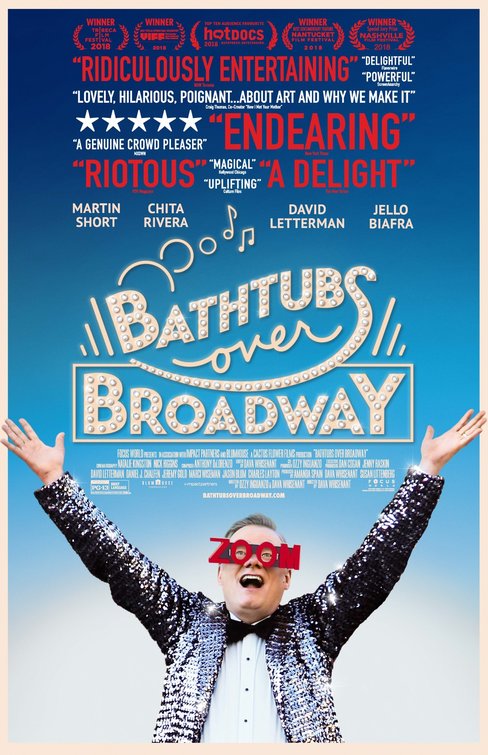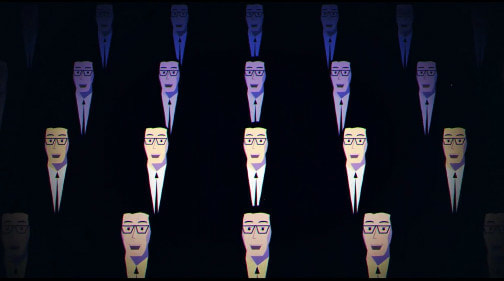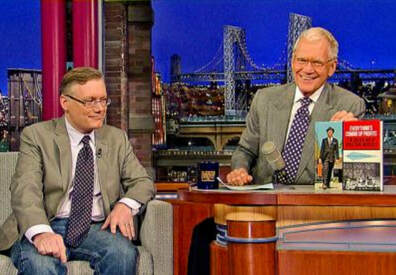BATHTUBS OVER BROADWAY
Monday, May 13, 7:30 pm
CAST & CREW
A Documentary Directed by Dava Whisenant
Featuring Chita Rivera, David Letterman, Don Bolles,
Florence Henderson, Jello Biafra, Martin Short,
Melody Rogers, & Susan Stroman
Rated PG-13 87 Mins.
A Documentary Directed by Dava Whisenant
Featuring Chita Rivera, David Letterman, Don Bolles,
Florence Henderson, Jello Biafra, Martin Short,
Melody Rogers, & Susan Stroman
Rated PG-13 87 Mins.

Reviewed by Alonso Duralde / TheWrap
If Dava Whisenant’s joyous documentary “Bathtubs Over Broadway” served only to spotlight the occluded corner of American musical history known as the “industrial musical,” it would be perfectly entertaining in its own right. But in its portrayal of one man’s unusual journey, the film has much to say about turning ironic amusement into unalloyed appreciation.
And if you don’t know what an “industrial musical” is, relax — we were never meant to see them in the first place. Starting in the 1950s, these shows were crafted to entertain and inspire the sales reps from companies like Xerox and General Electric. Expensive and elaborate, they were often performed only a few times, at conventions or sales meetings, and they mostly exist now on souvenir soundtrack recordings (of shows with names like “Diesel Dazzle” or “The Bathrooms Are Coming!”) that weren’t intended to be shared with the general public.
Decades later, “Late Night with David Letterman” writer Steve Young began stumbling upon these albums as he started collecting bizarre bits of vinyl effluvia for the “Dave’s Record Collection” segment of the show. While Letterman dismissed a song called “My Insurance Man” as being “more annoying than listening to my insurance man,” Young found himself hooked.
A self-described comedy casualty — someone who’s been working in the field so long that almost nothing funny provokes a response anymore — Young started tracking down these “For Internal Use Only” records, a trek that put him in touch first with other collectors (including punk legends Jello Biafra of the Dead Kennedys and Don Bolles of The Germs), and then with the performers and the composers behind these unusual, unknown extravaganzas.
The industrial musical wound up being a fertile training ground for Broadway; we see some big names-to-be listed in the liner notes, and “Bathtubs” gets Chita Rivera, the late Florence Henderson, Martin Short, Tony-winning director Susan Stroman and “Fiddler on the Roof” co-creator Sheldon Harnick to sit down with Young to discuss their participation in these shows. Stroman shares how dealing with dancing beer cans shaped her later direction of hits like “The Producers,” while Short remembers the industrials as a desirable gig, with great pay and good hotel rooms.
The genre being examined here is a fascinating one, and you’d be surprised how hummable songs like “22 Slices of Bread” or “My Bathroom” can be. Whisenant, who also edits, loops in tantalizing archival footage of these shows, with beaming singers extolling the virtues of AB Dick copy machines and Purina Dog Chow’s incentives to grocers. One could hardly accuse these performers of “selling out”; they might be performing at the behest of corporate America, but these kids are clearly giving it their all.
But just as fascinating is Steve Young’s journey from someone with no hobbies and seemingly no friends outside of his immediate family to a dogged cultural anthropologist who grows close to his fellow fans and to the artists who never thought anyone would ask them about that show they wrote about tractors. We see Young get close with singers and writers, and particularly two composers; he winds up collaborating with one — Hank Beebe, the man behind “Diesel Dazzle” — and delivering a eulogy for another. As you might imagine from a pair of Letterman veterans (Whisenant was an editor on the show), the interviews with Young’s co-workers and family express a deadpan astonishment at his area of interest; thankfully, the movie loves and respects creatives like Patt Stanton Gjonola (the singer of “My Bathroom”) and Beebe as much as Young does.
And while the film never specifically connects these dots, “Bathtubs Over Broadway” is about what happens when admiration replaces snark. Letterman (who executive produced and is interviewed here) and his show represented a sort of Ground Zero for a specific kind of Generation X hipper-than-thou humor, and to see one of his writers evolve from mocking these corporate shows to unabashedly adoring them provides a road map for lovers of kitsch who want to take the “guilty” out of “guilty pleasure.”
“Bathtubs Over Broadway” is pure pleasure, both in its exploration of a hidden and uniquely American corner of show business and its portrait of the charmingly nerdy Young and his singular path toward rescuing this sub-sub-sub-genre while many of its executors are still alive to tell their stories.
If Dava Whisenant’s joyous documentary “Bathtubs Over Broadway” served only to spotlight the occluded corner of American musical history known as the “industrial musical,” it would be perfectly entertaining in its own right. But in its portrayal of one man’s unusual journey, the film has much to say about turning ironic amusement into unalloyed appreciation.
And if you don’t know what an “industrial musical” is, relax — we were never meant to see them in the first place. Starting in the 1950s, these shows were crafted to entertain and inspire the sales reps from companies like Xerox and General Electric. Expensive and elaborate, they were often performed only a few times, at conventions or sales meetings, and they mostly exist now on souvenir soundtrack recordings (of shows with names like “Diesel Dazzle” or “The Bathrooms Are Coming!”) that weren’t intended to be shared with the general public.
Decades later, “Late Night with David Letterman” writer Steve Young began stumbling upon these albums as he started collecting bizarre bits of vinyl effluvia for the “Dave’s Record Collection” segment of the show. While Letterman dismissed a song called “My Insurance Man” as being “more annoying than listening to my insurance man,” Young found himself hooked.
A self-described comedy casualty — someone who’s been working in the field so long that almost nothing funny provokes a response anymore — Young started tracking down these “For Internal Use Only” records, a trek that put him in touch first with other collectors (including punk legends Jello Biafra of the Dead Kennedys and Don Bolles of The Germs), and then with the performers and the composers behind these unusual, unknown extravaganzas.
The industrial musical wound up being a fertile training ground for Broadway; we see some big names-to-be listed in the liner notes, and “Bathtubs” gets Chita Rivera, the late Florence Henderson, Martin Short, Tony-winning director Susan Stroman and “Fiddler on the Roof” co-creator Sheldon Harnick to sit down with Young to discuss their participation in these shows. Stroman shares how dealing with dancing beer cans shaped her later direction of hits like “The Producers,” while Short remembers the industrials as a desirable gig, with great pay and good hotel rooms.
The genre being examined here is a fascinating one, and you’d be surprised how hummable songs like “22 Slices of Bread” or “My Bathroom” can be. Whisenant, who also edits, loops in tantalizing archival footage of these shows, with beaming singers extolling the virtues of AB Dick copy machines and Purina Dog Chow’s incentives to grocers. One could hardly accuse these performers of “selling out”; they might be performing at the behest of corporate America, but these kids are clearly giving it their all.
But just as fascinating is Steve Young’s journey from someone with no hobbies and seemingly no friends outside of his immediate family to a dogged cultural anthropologist who grows close to his fellow fans and to the artists who never thought anyone would ask them about that show they wrote about tractors. We see Young get close with singers and writers, and particularly two composers; he winds up collaborating with one — Hank Beebe, the man behind “Diesel Dazzle” — and delivering a eulogy for another. As you might imagine from a pair of Letterman veterans (Whisenant was an editor on the show), the interviews with Young’s co-workers and family express a deadpan astonishment at his area of interest; thankfully, the movie loves and respects creatives like Patt Stanton Gjonola (the singer of “My Bathroom”) and Beebe as much as Young does.
And while the film never specifically connects these dots, “Bathtubs Over Broadway” is about what happens when admiration replaces snark. Letterman (who executive produced and is interviewed here) and his show represented a sort of Ground Zero for a specific kind of Generation X hipper-than-thou humor, and to see one of his writers evolve from mocking these corporate shows to unabashedly adoring them provides a road map for lovers of kitsch who want to take the “guilty” out of “guilty pleasure.”
“Bathtubs Over Broadway” is pure pleasure, both in its exploration of a hidden and uniquely American corner of show business and its portrait of the charmingly nerdy Young and his singular path toward rescuing this sub-sub-sub-genre while many of its executors are still alive to tell their stories.
DISCUSSION FOLLOWS EVERY FILM!
$6.00 Members / $10.00 Non-Members
TIVOLI THEATRE
5021 Highland Avenue I Downers Grove, IL
630-968-0219 I www.classiccinemas.com
We apologize—Movie Pass cannot be used for AHFS programs.
$6.00 Members / $10.00 Non-Members
TIVOLI THEATRE
5021 Highland Avenue I Downers Grove, IL
630-968-0219 I www.classiccinemas.com
We apologize—Movie Pass cannot be used for AHFS programs.








